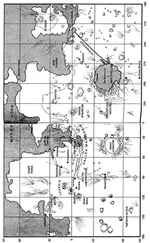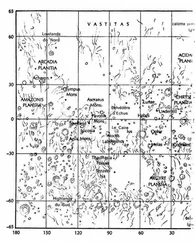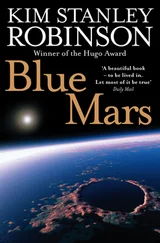Kim Robinson - Blue Mars
Здесь есть возможность читать онлайн «Kim Robinson - Blue Mars» — ознакомительный отрывок электронной книги совершенно бесплатно, а после прочтения отрывка купить полную версию. В некоторых случаях можно слушать аудио, скачать через торрент в формате fb2 и присутствует краткое содержание. Год выпуска: 1996, ISBN: 1996, Издательство: Spectra/Bantam Dell/Random House, Жанр: Космическая фантастика, на английском языке. Описание произведения, (предисловие) а так же отзывы посетителей доступны на портале библиотеки ЛибКат.
- Название:Blue Mars
- Автор:
- Издательство:Spectra/Bantam Dell/Random House
- Жанр:
- Год:1996
- ISBN:0-553-10144-7
- Рейтинг книги:3 / 5. Голосов: 1
-
Избранное:Добавить в избранное
- Отзывы:
-
Ваша оценка:
- 60
- 1
- 2
- 3
- 4
- 5
Blue Mars: краткое содержание, описание и аннотация
Предлагаем к чтению аннотацию, описание, краткое содержание или предисловие (зависит от того, что написал сам автор книги «Blue Mars»). Если вы не нашли необходимую информацию о книге — напишите в комментариях, мы постараемся отыскать её.
Green Mars
The Martian Chronicles
Dune
Piblishers Weekly st
Blue Mars — читать онлайн ознакомительный отрывок
Ниже представлен текст книги, разбитый по страницам. Система сохранения места последней прочитанной страницы, позволяет с удобством читать онлайн бесплатно книгу «Blue Mars», без необходимости каждый раз заново искать на чём Вы остановились. Поставьте закладку, и сможете в любой момент перейти на страницу, на которой закончили чтение.
Интервал:
Закладка:
“Not so surprising. Who?”
He named everyone he had contacted. It was, sad to admit, most of them left; a dozen or so. “And all of us would like it if you were there too. I know I would like it more than anything.”
“It sounds interesting,” Ann said. “But first we have to cross this caldera.”
Walking over the rock, Sax was amazed anew by the stony reality of their world. The fundamentals: rock, sand, dust, fines. Dark chocolate sky, on this day, and no stars. The long distances with no blurring to define them. The stretch of ten minutes. The length of an hour when one was only walking. The feeling in one’s legs.
And there were the rings of the calderas around them, jutting far into the sky even when the two walkers were out in the center of the central circle, out where the later, deeper calderas appeared as big embayments in a single wall’s roundness. Out here the planet’s sharp curvature had no effect on one’s perspective, the curve was for once invisible, the cliffs free and clear even thirty kilometers away. The net effect, it seemed to Sax, was of a kind of enclosure. A park, a stone garden, a maze with only one wall separating it from the world beyond, the world which, though invisible, conditioned everything here. The caldera was big but not big enough. You couldn’t hide here. The world poured in and overflowed the mind, no matter its hundred-trillion-bit capacity. No matter how big the neural array there was still just a single thread of awed mentation, consciousness itself, a living wire of thought saying rock, cliff, sky, star.
The rock became heavily cracked by fissures, each one an arc of a circle with its center point back in the middle of the central circle: old cracks relative to the big new holes of the north and south circles, old cracks filled with rubble and dust. These rock crevasses made their walk into a wandering ramble — in a real maze now, a maze with crevasses rather than walls, yet just as difficult of passage as a walled one.
But they threaded it, and finally reached the rim of north circle, number 2 on Sax’s map. Looking down into it gave them a new perspective — a proper shape to the caldera and its circular embayments, a sudden drop to a heretofore hidden floor, a thousand meters below.
Apparently there was a climbing route down onto the floor of north circle; but when Ann saw the look on his face as she pointed it out — achievable only by rappelling — she laughed. They would only have to climb up out of it again, she said easily, and the main caldera wall was already tall enough. They could hike around north circle to another route instead.
Surprised by this flexibility, and thankful for it, Sax followed her around the north circle on its west circumference. Under the great wall of the main caldera they stopped for the night, popped the tent, ate in silence.
After sunset Phobos shot up over the western wall of the caldera like a little gray flare. Fear and dread, what names.
“I heard that putting the moons back in orbit was your idea?” Ann said from her sleeping bag.
“Yes, it was.”
“Now that’s what I call landscape restoration,” she said, sounding pleased.
Sax felt a little glow. “I wanted to please you.”
After a silence: “I like seeing them.”
“And how did you like Miranda?”
“Oh, it was very interesting.” She talked about some of the geological features of the odd moon. Two planetesimals, impacted, joined together imperfectly…
“There’s a color between red and green,” Sax said when it appeared she was done talking about Miranda. “A mixture of the two. Madder alizarin, it’s sometimes called. You see it in plants sometimes.”
“Uh-huhn.”
“It makes me think of the political situation. If there couldn’t be some kind of red-green synthesis.”
“Browns.”
“Yes. Or alizarins.”
“I thought that’s what this Free Mars-Red coalition was, Irishka and the people who tossed out Jackie.”
“An anti-immigration coalition,” Sax said. “The wrong kind of red-green combination. In that they’re embroiling us in a conflict with Earth that isn’t necessary.”
“No?”
“No. The population problem is soon going to be eased. The issei — we’re hitting the limit, I think. And the nisei aren’t far behind.”
“Quick decline, you mean.”
“Exactly. When it gets our generation, and the one after, the human population of the solar system will be less than half what it is now.”
“Then they’ll figure out a different way to screw it up.”
“No doubt. But it won’t be the Hypermalthusian Age anymore. It’ll be their problem. So, worrying so much about immigration, to the point of causing conflict, threatening interplanetary war… it just isn’t necessary. It’s shortsighted. If there was a red movement on Mars pointing that out, offering to help Earth through the last of the surge years, it might keep people from killing each other, needlessly. It would be a new way of thinking about Mars.”
“A new areophany.”
“Yes. That’s what Maya called it.”
She laughed. “But Maya is crazy.”
“Why no,” Sax said sharply. “She certainly is not.”
Ann said no more, and Sax did not press the issue. Phobos moved visibly across the sky, backward through the zodiac.
They slept well. The next day they made an arduous climb up a steep gully in the wall, which apparently Ann and the other red climbers considered the walker’s route out. Sax had never had such a hard day’s work in his life; and even so they didn’t make it all the way out, but had to pitch the tent in haste at sunset, on a narrow ledge, and finish their emergence the following day, around noon.
On the great rim of Olympus Mons, all was as before. A giant cored circle of flat land; the violet sky in a band around the horizon so far below, a black zenith above; little hermitages scattered in boulder ejecta that had been hollowed out. A separate world. Part of blue Mars, but not.
The hut they stopped at first was inhabited by very old red mendicants of some sort, apparently living there while waiting for the quick decline to strike them, after which their bodies would be cremated, and the ashes cast into the thin jet stream.
This struck Sax as overfatalistic. Ann apparently was likewise unimpressed: “All right,” she said, watching them eat their meager meal. “Let’s go try this memory treatment then.”
Many of the First Hundredargued for sites other than Underhill, arguing in a way that they didn’t even recognize as part of their group nature; but Sax was adamant, shrugging off requests for Olympus Mons, low orbit, Pseudophobos, Sheffield, Odessa, Hell’s Gate, Sabishii, Senzeni Na, Acheron, the south polar cap, Mangala, and on the high seas. He insisted that the setting for such a procedure was a critical factor, as experiments on context had proved. Coyote brayed most inappropriately at his description of the experiment with students in scuba gear learning word lists on the floor of the North Sea, but data were data, and given the data, why not do their experiment in the place where they would get the best results? The stakes were high enough to justify doing everything they could to get it right. After all, Sax pointed out, if their memories were returned to them intact, anything might be possible — anything — breakthroughs on other fronts, a defeat of the quick decline, health that lasted centuries more, an ever-expanding community of garden worlds, from thence perhaps up again in some emergent phase change to a higher level of progress, into some realm of wisdom that could not even be imagined at this point — they teetered on the edge of some such golden age, Sax told them. But it all depended on wholeness of mind. Nothing could continue without wholeness of mind. And so he insisted on Underhill.
Читать дальшеИнтервал:
Закладка:
Похожие книги на «Blue Mars»
Представляем Вашему вниманию похожие книги на «Blue Mars» списком для выбора. Мы отобрали схожую по названию и смыслу литературу в надежде предоставить читателям больше вариантов отыскать новые, интересные, ещё непрочитанные произведения.
Обсуждение, отзывы о книге «Blue Mars» и просто собственные мнения читателей. Оставьте ваши комментарии, напишите, что Вы думаете о произведении, его смысле или главных героях. Укажите что конкретно понравилось, а что нет, и почему Вы так считаете.












